| Listing 1 - 7 of 7 |
Sort by
|
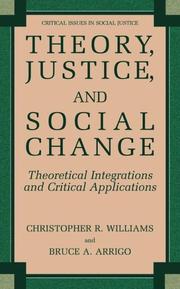
ISBN: 0387297685 0306485214 9780306485213 0306485206 Year: 2005 Publisher: New York, N.Y. Springer
Abstract | Keywords | Export | Availability | Bookmark
 Loading...
Loading...Choose an application
- Reference Manager
- EndNote
- RefWorks (Direct export to RefWorks)
Throughout history, social and intellectual crises have given rise to compelling suggestions for reform steeped in various progressive sensibilities. For example, within the discipline of criminology -- particularly during the 1980’s and 1990’s -- a number of unconventional theoretical perspectives emerged that sought to challenge many of the assumptions embedded within its own mainstream discourse, and to propose alternative solutions for meaningful, sustainable change. Conceived of as "critical" in overarching orientation, these efforts to rethink the foundations of criminological verstehen can be traced to several specific theoretical and methodological strands of inquiry (e.g., anarchism, peacemaking, chaos theory, postmodernism). Though distinct in some respects, these emerging models are linked paradigmatically by their shared discontent with conventional criminological thought and by their radicalized posture toward existing and previously unexamined epistemic crises. Collectively, this is an agenda for reform that seeks to establish a more humane and just social order, particularly as citizens and society confront the institutional and communal problems posed by crime, delinquency, and deviance. Theory, Justice, and Social Change: Theoretical Integrations and Critical Applications represents a provocative series of essays that systematically reviews or extends the role of critical social theory in fostering justice and change in several relevant, though problematic, social contexts. Mindful of the need to address both conceptual exegeses and pragmatic concerns, the articles contained in this volume grapple with the ongoing "double crisis" that confronts theory and practice in the construction of knowledge. By appropriating and integrating various insights from several heterodox and critically animated lines of inquiry, each chapter deftly exposes where and how conventional sociological and criminological thought has failed to effectively address such human social issues as homelessness, mental illness, minority rights, juvenile justice, global violence, and criminal punishment. In doing so, Theory, Justice, and Social Change provides new and much needed direction regarding theory development in the social sciences, and indicates why charting such a course of theory/action yields more enlightened prospects for justice and change in society and in our lives.
Social sciences. --- Criminology. --- Sociology. --- Personality. --- Social psychology. --- Psychology. --- Social Sciences. --- Sociology, general. --- Criminology & Criminal Justice. --- Law and Psychology. --- Personality and Social Psychology. --- Social justice. --- Critical theory. --- Social change. --- Criminology --- Critical theory --- Social change --- Social justice --- Equality --- Justice --- Change, Social --- Cultural change --- Cultural transformation --- Societal change --- Socio-cultural change --- Social history --- Social evolution --- Critical social theory --- Critical theory (Philosophy) --- Critical theory (Sociology) --- Negative philosophy --- Criticism (Philosophy) --- Philosophy, Modern --- Rationalism --- Sociology --- Frankfurt school of sociology --- Socialism --- Crime --- Social sciences --- Criminals --- Study and teaching --- Social ethics --- Criminology and Criminal Justice, general. --- Mass psychology --- Psychology, Social --- Human ecology --- Psychology --- Social groups --- Personal identity --- Personality psychology --- Personality theory --- Personality traits --- Personology --- Traits, Personality --- Individuality --- Persons --- Self --- Temperament --- Behavioral sciences --- Mental philosophy --- Mind --- Science, Mental --- Human biology --- Philosophy --- Soul --- Mental health --- Social theory
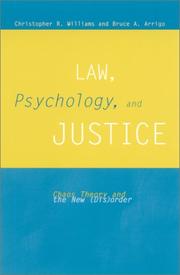
ISBN: 0791451844 Year: 2002 Publisher: Albany (N.Y.) : State university of New York press,
Abstract | Keywords | Export | Availability | Bookmark
 Loading...
Loading...Choose an application
- Reference Manager
- EndNote
- RefWorks (Direct export to RefWorks)
Psychology and law --- Insanity (Law). --- Chaotic behavior in systems. --- Criminal law --- Forensic psychology. --- Psychological aspects.
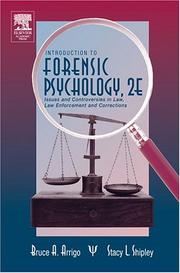
ISBN: 9780080468532 0080468535 9780120643516 0120643510 1280754273 9786610754274 Year: 2005 Publisher: Amsterdam ; Boston : Elsevier,
Abstract | Keywords | Export | Availability | Bookmark
 Loading...
Loading...Choose an application
- Reference Manager
- EndNote
- RefWorks (Direct export to RefWorks)
Introduction to Forensic Psychology, Second Edition is an original approach to understanding how psychologists impact the research, practice, and policy of crime, law, and justice. Divided into four sections on criminal forensics, civil forensics, policing and law enforcement, and corrections and prison practices, the text examines police, court, and correctional aspects of forensic psychology. Each of the twelve chapters are organized around relevant case illustrations, include comprehensive literature reviews, and discuss policy implications and avenues of future research. Each chapte
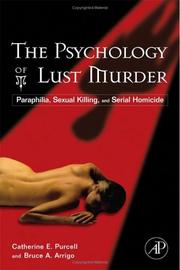
ISBN: 9780123705105 012370510X 008046257X 9780080462578 1280633522 9781280633522 9786610633524 6610633525 Year: 2006 Publisher: Boston, MA Academic Press
Abstract | Keywords | Export | Availability | Bookmark
 Loading...
Loading...Choose an application
- Reference Manager
- EndNote
- RefWorks (Direct export to RefWorks)
The Psychology of Lust Murder systematically examines the phenomenon of paraphilia (i.e., aberrant sexuality) in relationship to the crime of lust murder. By synthesizing the relevant theories on sexual homicide and serial killing, the authors develop an original, timely, sensible model that accounts for the emergence and progression of paraphilias expressed through increasingly violent erotic fantasies. Over time, these disturbing paraphilic images that, among other things, involve rape, body mutilation and dismemberment, torture, post-mortem sexual intercourse, and cannibalism, are all actualized. Thus, it is the sustained presence of deviant sexuality that contributes to and serves as underlying motive for the phenomenon of lust murder (a.k.a. erotophonophilia). Going well beyond theoretical speculation, the authors (Dr. Catherine Purcell, a forensic psychologist and Dr. Bruce Arrigo, a criminologist) apply their integrated model to the gruesome and chilling case of Jeffrey Dahmer. They convincingly demonstrate where and how their conceptual framework provides a more complete explanation of lust homicide than any other model available in the field today. The book concludes with a number of practical suggestions linked to clinical prevention, diagnosis, and treatment strategies; police training, profiling, and apprehension efforts; as well as legal and public policy responses to sexually violent and predatory assailants. Comprehensive in its coverage, accessible in its prose, and thoughtful in its analysis, The Psychology of Lust Murder is a must read for any person interested in the crime of erotophonophilia and those offenders responsible for its serial commission. * Contributes, in a thoughtful and scholarly way, to the audiences' existing library of books on crimes and criminals * Provides new and insightful information on the criminal behavior of Jeffrey Dahmer * Enables readers to compare and contrast different models/theories on sexual homicide and serial murder * Assists researchers, educators, public officials, and the lay public determine how best to respond to the phenomenon of lust murder.
Digital
ISBN: 9780123821690 012382169X Year: 2012 Publisher: [Place of publication not identified] Academic Press
Abstract | Keywords | Export | Availability | Bookmark
 Loading...
Loading...Choose an application
- Reference Manager
- EndNote
- RefWorks (Direct export to RefWorks)
This edition of Introduction to Forensic Psychology has been completely restructured to map to how courses on forensic psychology are taught, and features more figures, tables, and text boxes, textbook pedagogy. Uniquely. this book offers equal representation of criminal behavior, the court systems, and law enforcement/prisons. It also has equal representation of criminal and civic forensics and of issues pertaining to adults and children. new coverage of emerging issues in forensic psychology expanded case illustrations and vignettes, practice and ethics updates, and international trends new "key issue" overviews, boldface terms and concepts, and chapter reviews expanded coverage of corrections for juveniles.
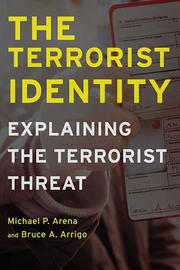
ISBN: 9780814707814 9780814707159 Year: 2006 Publisher: New York, N.Y. New York University Press
Abstract | Keywords | Export | Availability | Bookmark
 Loading...
Loading...Choose an application
- Reference Manager
- EndNote
- RefWorks (Direct export to RefWorks)
Digital
ISBN: 9781529205268 Year: 2021 Publisher: Bristol, UK Bristol University Press
Abstract | Keywords | Export | Availability | Bookmark
 Loading...
Loading...Choose an application
- Reference Manager
- EndNote
- RefWorks (Direct export to RefWorks)
| Listing 1 - 7 of 7 |
Sort by
|

 Search
Search Feedback
Feedback About UniCat
About UniCat  Help
Help News
News